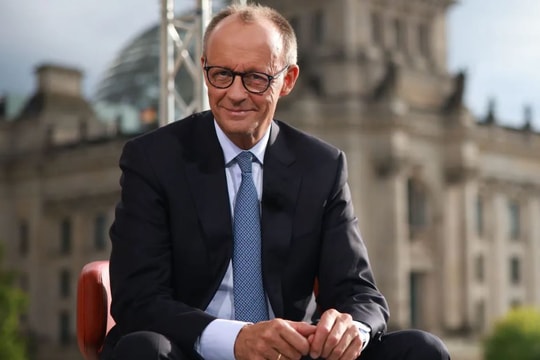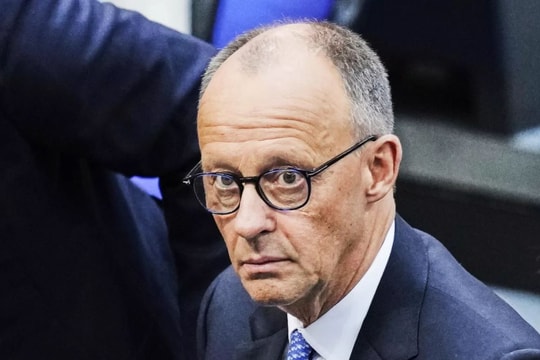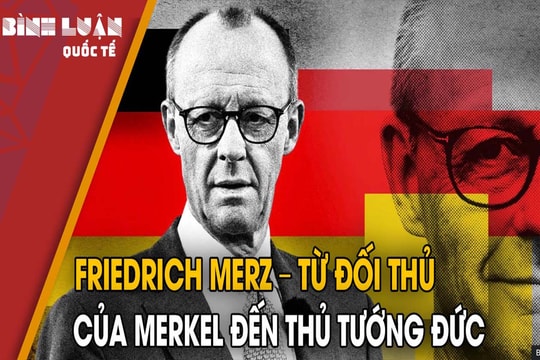Today, Germany's general election: Victory is unlikely to slip into Mrs. Merkel's hands
Today (September 24), 61.5 million German voters are expected to go to the polls to elect at least 598 members of parliament for the German Federal Parliament for the next four-year term.
The 88,000 polling stations across Germany opened at 8:00 a.m. and closed at 6:00 p.m. local time. Several German electoral units abroad held early elections two days ago.
 |
| CDU party election campaign poster. |
There are 42 political parties participating in this year's general election in Germany, but only 10 parties are running in all 16 German states. The capital Berlin recorded the fiercest competition with up to 24 party lists.
Security is being increased across Germany because, in addition to the general election, many other major German cities are also holding other important cultural and sporting events such as the Oktoberfest beer festival in Munich or the Berlin Marathon, which is expected to attract up to 60,000 participants today (September 24) in the capital Berlin. Therefore, tens of thousands of police officers have been deployed.
In addition, another concern is about cyber security when two weeks ago, a group of hackers in Germany discovered a security hole in the voting system in many states, raising suspicions about possible errors or fraud in the election results.
However, the campaigning continued until the day before the election. On Saturday, September 23, both German Chancellor Angela Merkel of the Christian Democratic Union (CDU) and her main rival, Martin Schulz of the Social Democratic Party (SPD), chose their own constituencies as the places where they would end their campaigns. Merkel held a rally in the state of Mecklemburg-West Pomerania while Schulz spoke in the city of Aachen, near his birthplace.
The final opinion polls released on Friday by the two institutes Insa and Forsa did not change much, with the CDU-CSU alliance predicted to win 34-36% of the total votes and the SPD to win between 21 and 22%.
However, with an expected absence of about a third of voters, along with the CDU-CSU's slight decline in recent days, the opposition SPD still hopes to create a surprise. SPD leader Martin Schulz announced that those who do not vote for Ms. Merkel will vote for the SPD. However, almost all observers assess that the possibility of the SPD overthrowing the leading position of the CDU-CSU is extremely low.
The question for the CDU-CSU and Ms. Merkel, therefore, is how will they win? This is an important factor because with current predictions, even if they win, the CDU-CSU will almost certainly not be able to win a majority to form a government on their own and will have to seek a coalition.
Therefore, if they win with a high percentage of votes, that is, over 40%, the CDU-CSU will be able to seek a coalition with a party like the Free Democratic Party - FDP, which is enough for a majority in the Federal Parliament. On the contrary, if they win with a lower percentage of votes, the CDU-CSU will have a headache designing coalition scenarios with the FDP, the Green Party and even the rival SPD.
In addition, the election results of Ms. Merkel's CDU-CSU party will certainly be compared with the rise of the far-right, fascist party "Alternative Way for Germany" - AfD, which is predicted to win up to 80 seats in the German Federal Parliament.
In Germany, the closer the election day gets, the more criticism Ms. Merkel receives regarding AfD because many people believe that her controversial policies, especially accepting millions of refugees, have created an environment for the AfD party to grow strongly in recent times.
That is why in recent days, Ms. Merkel has continuously warned German voters to prevent the extremist and fascist ideologies of AfD and affirmed that there will never be a coalition between the CDU-CSU party with AfD or the Left Party - Die Linke, which follows the left-wing line.
But, whether the election results meet the expectations of the CDU party or not, for Angela Merkel personally, the opportunity to make history is opening up before her eyes. If the CDU wins, which is very likely, then it is almost certain that Ms. Merkel will hold the position of German Chancellor for a fourth consecutive term, equaling the record of previous German Chancellors such as Adenauer or Helmut Kohl, which is 16 years.
Merkel’s stability becomes even greater when compared to the leaders of other countries in the world. Specifically, in the past 12 years of Merkel’s rule, Europe has witnessed 122 leaders come and go, and Germany’s partner powers such as the US, France, China or the UK have also experienced at least 2 to 3 generations of leaders. For the German people, the secret to Merkel’s “longevity” lies in her stability and steadfastness, both in her leadership decisions and in her personal qualities.
The first results of the Federal general election in Germany will be announced on the evening of September 24, local time in Germany./.
According to VOV
| RELATED NEWS |
|---|








